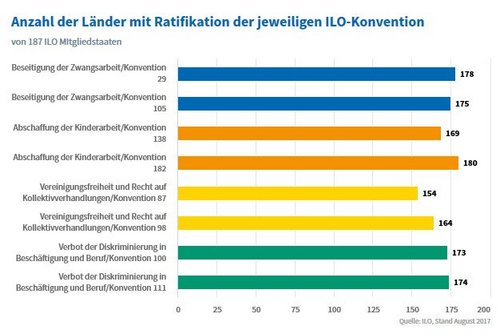Members of the EU Parliament call for tighter social standards in EU free trade agreements underpinned by sanctions in case of violations. The objective of this is to help workers in developing countries – but the opposite could be the case.

Beware of tighter social standards in free trade agreements

Members of the EU Parliament call for tighter social standards in EU free trade agreements underpinned by sanctions in case of violations. The objective of this is to help workers in developing countries – but the opposite could be the case.
At the European level, efforts are being made to impose stricter labour and social standards in free trade agreements (FTA) of the EU and to impose sanctions in case of violations:
- The European Commission has submitted a non-paper open for discussion. It presents two options for a reform of the sustainability chapter in FTA – one with and one without sanctions. The option without sanctions would be a minor extension of the status quo. The option with sanctions broadly draws on the FTA approach of the USA and Canada, which only allows sanctions if violations of labour and social standards negatively affect bilateral trade.
- Members of the European Parliament, on the other hand, put forward a proposal for a „Model Labour Chapter" for future FTA. This proposal would go far beyond the existing practice. In particular, it stipulates minimum wages and maximum working hours. Moreover, it foresees sanctions, which would be much more likely to be implemented than in the FTA approach of the USA and Canada.
With these proposals, the advocates of an extended sustainability package aim to make globalisation fairer and the EU a "force for a fairer global order," as the EU Commission itself strives for in its reflection paper "Harnessing Globalisation". A major objective is to improve the living conditions of workers in developing countries by giving them access to better social protection – coming in some respects much closer to the EU level. However, the introduction in FTA of higher cost-relevant labour and social standards underpinned by sanctions may run counter to the key objective.
Embed Code
<div id="highcharts-olomuwa"><script src="//cloud.highcharts.com/inject/olomuwa" defer="defer"></script></div>
Risk of adverse effects
Advocates of such a strategy overlook the fact that low wages and higher working hours in developing countries testify to lower productivity compared to industrialised countries. The workers in developing countries are relatively less skilled and are equipped with less capital and older technologies compared to employees in developed countries. As a result, they produce and earn less per working hour.
If considerably higher labour and social standards were established in EU free trade agreements in order to come significantly closer to EU standards, the comparative wage-cost advantage of developing countries would be endangered. If wages were increased by much more than labour productivity allows, unit labour costs would rise significantly. Companies that rely on the export of labour-intensive products from developing countries to the EU would come under cost pressure. They may even be forced to close or relocate their production. In this case, many of their employees would lose their jobs in the export sector, where working conditions are generally better than in the domestic economy or the informal sector. This risk affects domestic companies in developing countries much more than subsidiaries of multinational companies, which usually provide their workers with better machines and innovative technologies. Overall, strictly enforcing much higher cost-relevant standards could harm the workers who are actually meant to be protected.
Protectionism under the guise of social justice
On closer examination, the proposals could even prove to be a protectionist strategy under the guise of social justice, because developing countries could be pushed out of the market. Overly high cost-relevant labour and social standards would act as trade barriers that protect industrialised countries from competition by developing countries. Workers in developing countries are set against workers in industrialised countries.
Even if only a moderate increase of labour and social standards is demanded at the outset, there is still the risk that lobbying pressures in industrialised countries would lead to a faster rise of these standards than domestic firms in the developing countries can afford.
Resistance of developing countries and impeding future FTA
It is therefore not surprising that developing countries are often opposed to labour and social standards that industrialised economies impose on them by way of trade agreements. They not only fear protectionist measures, but also argue that their right to regulate (which the EU has rightly claimed with vehemence in the course of TTIP) is impaired by such reinforced FTA.
The discussed proposals would thus make it harder for the EU to negotiate FTA with developing countries. It is foreseeable that the original objective of FTA – the reduction of trade barriers, which leads to better market access and welfare gains on both sides – would be adversely affected.
Basic core labour standards of the ILO appropriate
To be clear, demands for basic work and social norms are fully appropriate. In this respect, the International Labour Organization (ILO) plays an important role. In the course of time, it has set up important so-called core labour standards that include fundamental rights and prohibitions. This concerns the protection against forced labour and child labour, the prohibition of discrimination, the freedom of association and collective bargaining. Also, measures to protect against health hazards in the workplace are reasonable.
In contrast to ambitious targets for minimum wages or maximum working hours, the core labour standards have little effects on labour costs. Concerns of developing countries about hidden protectionism are much less prevalent in this case. It is thus not surprising that a large number of developing countries have also ratified these core labour standards of the ILO. In the summer of 2017, over 170 of the 187 ILO member states have ratified the eight core labour standards on average (figure).
More on the topic

Strengthened competition in payment services
Starting on January 13, 2018, the Second Payment Services Directive (PSD2) will apply in the European Union. Among other things, the Directive’s aim is to adapt regulation to the innovations in payment services and to promote the Single Market for non-cash ...
IW
An EU comparison: The structure of consumer spending
The purchasing power of EU consumers varies considerably. This is also reflected by the structure of households’ expenditure. The share of food in consumer spending is highest in Romania, one of the countries with the lowest per capita income. On the other ...
IW